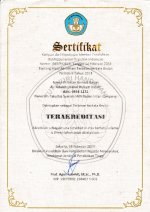The Contextualization of Sharia and Its Contribution to The Development Of The Indonesian National Law
Abstract
This article asserts an argument that sharia needs to be contextualized along with changing conditions, place and time. The reason is very clear, Islam and the initial Islamic Shari’a revealed in Mecca in 610 AD were very flexible and contextual. Islam accepts Hanif religion (the religion of Prophet Ibrahim) with the aim of perfecting the Hanif religion which has been misunderstood, perpetuating the teachings of the good and great Hanif religion, and rectifying its teachings to perpetuate its noble and invaluable teachings. Islam also respected Arab tradition as well to perpetuate noble and beneficial Arab traditions, and to remove the traditions that were no longer beneficial. This is the foremost nature of Islam according to Khalil Abdul Karim which he termed as a blueprint for the practice of Islam and Islamic law in today’s public space. Religion is for humans, as Allah the Most Just is very concerned with the realities of the social life of people. The law is also created to discipline the community life, and therefore, its main concern is the benefit of human life,. In this context, the historicity of the initial Shari’a can be used as the basis in applying Islamic law anywhere and anytime.
Keywords
Full Text:
PDFReferences
Abdillah, M. (2004). Demokrasi yang Religius: Membincang Kembali Konsep Demokrasi di Indonesia, Disampaikan dalam Pidato Pengukuhan Guru Besar Fikih Siyasah. Jakarta: UIN Jakarta.
al-Asymawi, M. S. (2004). Ushul asy-Syariah, diterjemahkan ke dalam bahasa Indonesia dengan judul: Nalar Kritis Syariah, terj. Luthfi Thomafi. Yogyakarta: LKiS.
Azizy, A. Q. (2004). Eklektisisme Hukum Nasional: Kompetisi Antara Hukum Islam dan Hukum Umum. Yogyakarta: Gama Media.
GP, M. A. (2017). Competing Political Ideologies on the Implementation of Islamic Law in Indonesia: Historical and Legal Pluralist Perspective. Ahkam, Vol. 17 No. 2, 276.
Kamsi. (2012). Politik Hukum dan Positivasi Syariat Islam di Indonesia. Yogyakarta: SUKA-Press.
Kansil, C. K. (2000). Pengantar Ilmu Hukum dan Tata Hukum Indonesia . Jakarta: Balai Pustaka.
Lev, D. S. (1972). Islamic Courts in Indonesia: A Study of the Political Bases of Legal Institutions. Berkeley: University of California Press.
Mahmudah, S. (2013). Historisitas Syariat Islam: Analisis Sejarah kemunculan Hukum Islam dengan Perspektif Foucauldian (Bandar Lampung: Aura Printing dan Publishing, 2013). Bandar Lampung: Aura Printing & Publishing.
Mahmudah, S. (2016). Historisitas Syariah: Kritik Relasi Kuasa Khalil Abdul Karim. Yogyakarta: LKiS.
Mahmudah, S. (2016). Reformasi Syariat Islam (Kritik Pemikiran Khalil Abdul Karim). al-Adalah, 13 No. 1.
Panggabean, T. A. (2004). Politik Syariat Islam: dari Indonesia Hingga Nigeria. Jakarta: Pustaka Alvabet.
Pardjaman, R. (2013). Transformasi Nilai-Nilai Syariah Ke Dalam Sisitem Hukum Nasional (Sebuah Pendekatan Hermeneutika). Al-Adalah, Vol. XI, No. 2 .
Pound, R. (1954). An Introduction to the Philosophy of Law . New Heaven: Yale University Press.
Soeroso, R. (2001). Pengantar Ilmu Hukum . Jakarta: Sinar Grafika.Yasardin, ‘The Transformation of Sharia Values into the Development of Indonesian National Law’, presented at the National Seminar, UIN Syarif Hidayatullah, Jakarta, 2018.
DOI: http://dx.doi.org/10.24042/adalah.v16i1.3393
Refbacks
- There are currently no refbacks.
Copyright (c) 2019 AL-'ADALAH
Al-'Adalah is licensed under a Creative Commons Attribution-ShareAlike 4.0 International License.



.png)
_(1).png)
_(1).png)

.png)
